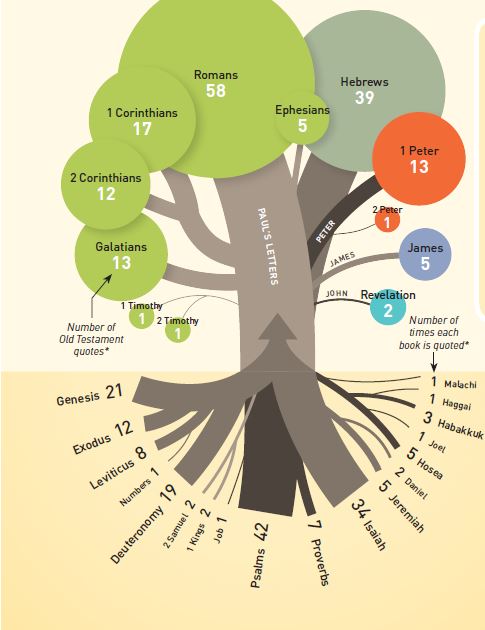New Believer’s Bible
Learn more about the New Believer’s Bible
Take a look inside the New Believer’s Bible
Join us and Pastor Laurie on YouVersion for a 7-day reading plan in the New Believer’s Bible
Learn more about the New Believer’s Bible
Take a look inside the New Believer’s Bible
Join us and Pastor Laurie on YouVersion for a 7-day reading plan in the New Believer’s Bible
“’In a little while you won’t see me anymore. But a little while after that, you will see me again.’

Some of the disciples asked each other, ‘What does he mean when he says, ‘In a little while you won’t see me, but then you will see me,’ and ‘I am going to the Father’? And what does he mean by ‘a little while’? We don’t understand.’
Jesus realized they wanted to ask him about it, so he said, “Are you asking yourselves what I meant? I said in a little while you won’t see me, but a little while after that you will see me again. I tell you the truth, you will weep and mourn over what is going to happen to me, but the world will rejoice. You will grieve, but your grief will suddenly turn to wonderful joy. It will be like a woman suffering the pains of labor. When her child is born, her anguish gives way to joy because she has brought a new baby into the world. So you have sorrow now, but I will see you again; then you will rejoice, and no one can rob you of that joy. At that time you won’t need to ask me for anything. I tell you the truth, you will ask the Father directly, and he will grant your request because you use my name. You haven’t done this before. Ask, using my name, and you will receive, and you will have abundant joy.

‘I have spoken of these matters in figures of speech, but soon I will stop speaking figuratively and will tell you plainly all about the Father. Then you will ask in my name. I’m not saying I will ask the Father on your behalf, for the Father himself loves you dearly because you love me and believe that I came from God. Yes, I came from the Father into the world, and now I will leave the world and return to the Father.”

Then his disciples said, ‘At last you are speaking plainly and not figuratively. Now we understand that you know everything, and there’s no need to question you. From this we believe that you came from God.’
Jesus asked, ‘Do you finally believe? But the time is coming—indeed it’s here now—when you will be scattered, each one going his own way, leaving me alone. Yet I am not alone because the Father is with me. I have told you all this so that you may have peace in me. Here on earth you will have many trials and sorrows. But take heart, because I have overcome the world.” John 16:16-33, NLT
Note from the Every Man’s Bible

In this world, we will encounter “many trials and sorrows.” Some of these difficulties are inevitable and beyond our control. These can be endured with God’s help. On the other hand, some of our suffering is self- inflicted and can be avoided.
In such situations, God still offers us peace as we muster the courage to make needed changes in our lives. God’s forgiveness and loving acceptance can give us peace as we face our trials and sorrows, even when the pain we face is ultimately our own fault. He has the power to lead us down the path of life; he has already overcome all the obstacles that stand in our way.
“Teach these things and insist that everyone learn them. Don’t let anyone think less of you because you are young. Be an example to all believers in what you say, in the way you live, in your love, your faith, and your purity.” 1 Timothy 4:11-12, NLT
Notes from the Life Application Study Bible

Timothy was a young pastor. It would have been easy for older Christians to look down on him because of his youth. He had to earn the respect of his elders by setting an example in his speech, life, love, faith, and purity. Regardless of your age, God can use you. Whether you are young or old, don’t think of your age as a handicap. Live so others can see Christ in you.
Apparently Timothy needed some encouragement. Most likely, so do you and others around you. Each day we have opportunities to support and inspire family members, fellow workers, friends, neighbors, pastors, and even total strangers. People need help and affirmation in their daily lives. Paul modeled five important principles to help us encourage others:


See the Personality Profile of Timothy from the Life Application Study Bible, Third Edition
The Life Application Study Bible, Third Edition, is available in Personal Size, Full Size, and Large Print. Learn more
by Molly Jo Nyman, freelance writer
It started with dissatisfaction.

Notes written by Bible scholars in Ron Beers’s study Bible were full of facts but left 25-year-old Ron uninspired.
“All the notes were information,” Ron recalls. “In Genesis 41, I learned that ‘all the Egyptians were clean shaven, so it was important that Joseph appear that way in the presence of Pharaoh.’ Well, that’s interesting but . . . so what?”
With gifted storyteller and author V. Gilbert Beers as his father, Ron was used to being inspired. Family meals were served with Bible stories so engaging that no one zoned out. His young life was rich with experiences that helped him lean in and expect the Bible to connect to everyday life.
Ron had an unusual response to his dissatisfaction: He studied his study Bible.
And his discovery was startling.
After a thorough review of the study Bible he owned, along with a few others, Ron found zero help in connecting daily struggles and needs with the wisdom of Scripture. No notes on how to deal with worry, priorities, doubts, or relational conflict. Not one connection to personal application.

He began to wonder if there could be a study Bible that was more helpful. He thought about what it might look like. Then he became convinced that a completely new and different kind of study Bible was needed.
This new kind of study Bible would continue to provide accurate information, but it would also connect to inspiration. It would help people not just to know but also to do so that they could experience the transformative power of God’s Word. It would connect the dots.

As luck—or rather God—would have it, Ron was working at the national headquarters of Youth for Christ in Illinois on new product development (primarily books). It was a front row seat not only to see the need for an application-oriented study Bible but also to observe the approaches—what worked and what didn’t in helping people connect God’s Word to everyday life.
Youth for Christ was passionate about reaching young people with the gospel and helping them become “lifelong followers of Jesus who lead by their Godliness in lifestyle . . .” (as quoted in their mission statement). And in the mid-1980s, youth ministry was thriving with hundreds of high school kids showing up for club meetings.
With crazy crowd breakers and hilarious games, meetings were fun but also focused on felt needs and common youth issues. Topics like loneliness or fear were opportunities to show kids that Jesus cared about them personally and how his Word could actually help them.

When the Bible was taught, the focus wasn’t on Bible literacy, cultural context, and historical facts. It was focused on the exact thing Ron wanted this newfangled study Bible to do.
“All around us people were asking, ‘If God really cares about me and my daily life, my community, my nation, my world, then shouldn’t the Bible put forth a clearer blueprint for how to navigate daily challenges? Shouldn’t its transformative power be more obvious?’ That’s what we wanted to get at,” recalls Ron.
“Because when people see how amazingly relevant the Bible is to any issue they’re facing, they’ll hunger and thirst to devour the Scriptures, deepening their relationship with God and transforming their relationships with others.”

Ron brought the idea of an application-oriented study Bible for high school students to his boss, Bruce Barton, vice president of the ministry service division and the force behind Youth for Christ’s new publishing emphasis at the time, and he also shared it with others.
According to Jim Galvin, Youth for Christ’s national training director at the time, the idea germinated and grew as most new ideas do—with a little bit of conflict and bashing.
“We would meet to brainstorm products for Youth for Christ, and Ron kept bringing [the idea for a youth application study Bible] up. I was the most vocal against it,” Galvin said. “High school students didn’t use study Bibles. We worked with high school students; we knew them. And they never, ever open a study Bible.”
But that didn’t stop Ron from continuing to bring it up. So to squash the idea, Galvin wrote a detailed memo.

“It basically said, if we’re going to do a study Bible for high school kids, it has to be done right, and it has to include profiles of Bible people, charts, a Bible outline, study notes, and a whole bunch of features,” Galvin recalled. “I was hoping Ron and others would say, ‘This is way too much work. High school kids wouldn’t use this product, anyway.’
“Talk about backfiring. When Ron got the memo, his reaction was, ‘Now that’s what I’m talking about!’”

Fun fact: Notes and feature in your Life Application Study Bible were written, revised, and reviewed by writers, editors, and scholars at least 17 times. As the story of its creation is told, you can trust its guidance even more.
The Life Application Study Bible is now available in Personal Size, Full Size, and Large Print. Learn more
Note from the Christian Basics Bible
“But the Holy Spirit produces this kind of fruit in our lives: love, joy, peace, patience, kindness, goodness, faithfulness, gentleness, and self-control. There is no law against these things!” Galatians 5:22-23, NLT.

Throughout this letter to the Galatians, Paul has been arguing that trying to obey the Jewish Law only leads to slavery (Galatians 4:8-31). But Christ has set us free (5:1), and the way to maintain that freedom is to “let the Holy Spirit guide [our] lives” (5:16), to be “directed by the Spirit” (5:18), and to “follow the Spirit’s leading in every part of our lives” (5:25). After all, it was the Holy Spirit, not religious rules, that brought us to Christ, and it is he who helps us see God as our “Abba”—our daddy (4:6).

That is why, no matter what experiences of the Spirit we may have had, we all need to “be filled with the Holy Spirit”—literally, to “go on being filled with the Spirit” (Ephesians 5:18). We need to “let the Holy Spirit guide [our] lives” (Galatians 5:16)—that is, to follow his leadings and be filled with his power. As we do, his fruit grows in us—“love, joy, peace, patience, kindness, goodness, faithfulness, gentleness, and self-control” (5:22-23). These are not his fruits (plural), but his fruit (singular); it is as if nine different fruits were all found on one tree. All of them (not just those we like or find easy) should be growing in us. No matter how gifted someone is, lack of this fruit is a serious indicator that they are not living by the Spirit.
Learn more about the Christian Basics Bible
I recently saw a Twitter post about a garbage man who was continuing to do his job amidst the COVID-19 quarantine. I thought how integral his role is in all our health and safety. So often we take for granted those around us who have jobs that aren’t in the spotlight. God calls each of us to do everything as if we are doing it for him (Colossians 3:23). This excerpt from the Africa Study Bible helps us understand Psalm 23 wasn’t out of David’s greatness, but humble experience as a shepherd boy.
Article from the Africa Study Bible

When David was tending his sheep, he had no idea how God would use his life experience. His experience in guarding the sheep gave him the skills and confidence he needed to slay Goliath (1 Samuel 17:40). In this most beloved psalm, David writes from his experience under the guidance of the Holy Spirit to write a poem that is one of the most beautiful and encouraging things ever written—perhaps the most quoted part of the Old Testament. How many of us have gone to take comfort in the words of Psalm 23 in our darkest moments?

David was assigned the care of sheep as he was the youngest and least qualified of his brothers. When they went off to war, he was left at home. Shepherds were generally looked down upon in society, yet without David’s experience with sheep, Goliath would have not been slain and we would not have Psalm 23. Most young people, even new university graduates, must start with the work nobody else wants to do. Whatever God has called you to do when you are young, do not despise the experience. Work hard, learn all you can, and someday in the future you may be very surprised how God uses it to equip you for your most important work and to greatly bless others.
Article from the New Believer’s Bible
“In the beginning the Word already existed. The Word was with God, and the Word was God. He existed in the beginning with God. God created everything through him, and nothing was created except through him. The Word gave life to everything that was created, and his life brought light to everyone. The light shines in the darkness, and the darkness can never extinguish it. John 1:1-5, NLT
Eventually every child gets around to asking the question, “Where did God come from?” And there is no easy answer for that, except to say, God has always existed. He is self-existent. He already existed in the beginning. God has no beginning, nor does he have an end.

It is worth noting that the Bible never tries to prove the existence of God. It just says, “In the beginning God created the heavens and the earth” (Genesis 1:1). You can’t go back any further than that! Now, certain people would like to eliminate the major player here. They’d rather the verse read, “In the beginning, the heavens and the earth . . .” But if we eliminate God, then we have a big problem. In the beginning . . . what?
Some would say, “In the beginning, a mass of gases was floating in space.” But that’s not the beginning. Where did the mass of gases come from? Where did space come from? The Bible simply says, “In the beginning God.”
The Bible doesn’t tell us when the beginning was; it just says God was already there. And here, John tells us that the Word, Jesus Christ, already existed in the beginning with God ( John 1:2). He was with God, he was God, and God created everything through him ( John 1:1, 3).

Sometimes we speak of God by describing his attributes: omniscience, omnipotence, omnipresence, sovereignty, truth, righteousness, holiness, and love. While these descriptions can help, if you really want to know what God is like, then look at Jesus—God in human form. Jesus did not represent God as a glorified man; he was God himself among us, the Messiah in human flesh, God with skin on. God has a face. Jesus, who embodied all of God’s attributes, walked our planet as a man and breathed our air and felt our pain. He was so knowledgeable he could predict future events, so humble he could get on his knees and wash a friend’s dirty feet, so powerful he could calm the wind and waves with just a word, so approachable that children laughingly climbed into his arms. In Jesus, God spelled himself out in language that every one of us can understand.
By Mike Beaumont, editor of the Christian Basics Bible
Penicillin, saccharine, Coca-Cola, the microwave oven and the pacemaker…all have one thing in common: they all came about by accident, discovered when someone found something that they weren’t originally looking for. And that’s how the Christian Basics Bible came about.

It all started with my being deported from India….
After more than 25 years of working with churches, leaders and seminaries in India, I landed at Chennai to find that I had been ‘red flagged’ and was promptly put back on the very plane from which I had just disembarked. Over those 25 years, I had made hundreds of friends – one of them, a seminary student from Myanmar (formerly known as Burma) with whom I had become particularly close when his father suddenly died and, as acting principal of his seminary at that time, was able to help him get back home to his family in that time of need. That moment forged a link between us that lasts to this day. When he graduated, he returned to Myanmar where he became a lecturer at a seminary in Yangon. After much pestering, he persuaded me to go there as a visiting professor – and so began my love for Myanmar and its many different peoples.
As it happens, my long-standing friend and co-author of Christian Basics Bible (CBB), Martin Manser, also has a link with Myanmar since he married a Burmese woman. And it was this love of Myanmar on both our parts that would lead to the production of CBB.
It was while Martin was in Yangon visiting his wife’s family on one occasion that he met the Director of Christian Literature Crusade Myanmar. Knowing Martin was an author and editor of many years’ experience, he shared with him his longing for some kind of Study Bible in the Burmese language, since there wasn’t a single one at that time, and wondered whether Martin might be able to help. Martin promised to give it some thought. And as he did, two things came to mind. First, he remembered that he had written some short introductions to the books of the Bible some years earlier, but nothing had come of the material. Second, he reflected on how he and I had collaborated on writing projects for over 20 years. Suddenly, the light went on. What if he put those two things together?

When he got back home, he contacted me, asking whether I would be interested in partnering with him in producing the first ever Study Bible in the Burmese language. As we prayed about it and discussed the idea further, we began to get really excited and felt this was something that God wanted us to do. For us in the West, where there is a plethora of Bible translations and editions, it’s hard to grasp what it is like for many Christians in the world where they often only have one basic translation, often without any notes or helps of any kind in it. This was certainly the case in Myanmar, where there was only one Bible text – the Judson Bible, produced in 1834 and without a single footnote or comment in it. Even worse, there had been no revisions of that 1834 text; so many of the words in it were now simply quite meaningless in modern Burmese. So CLC got to work slightly updating the Bible text, while Martin and I got to work at our end – Martin using his skills as an editor to plan and shape the material, me using my skills as a writer to start producing the content – introductions to each Bible book and notes on key themes every 6 or 7 chapters or so. The publisher had requested we keep the material simple and compact, yet comprehensive – quite a challenge! And, of course, it had to be culturally relevant for Myanmar where some issues arise that just aren’t tissues in the West. After lots of hard work, we are glad to say that the Myanmar Study Bible was finally in the hands of Christians there – the first Study Bible in the Burmese language.

But what, I hear you thinking, does all this have to do with Christian Basics Bible?
Because this is where the penicillin and saccharin and Coca-Cola come in. For it was while we were working on this project for Myanmar that the idea of CBB was born. One day, during a phone conversation about the project, Martin suddenly said to me, “You know, this material is really good. I’m sure there is potential for it being used much more widely.” And immediately, I knew that he was right. For there we were, trying to express what are often complex and profound spiritual truths in simple ways for Myanmar Christians, when many in the West were in need of exactly the same thing. In fact, I had been greatly exercised for a number of years as a pastor by the fact that more and more people in the West were becoming more and more ignorant of even the most basic Bible stories (let alone doctrines). And so when they became Christians, they brought very little, if any, of the Bible background that people of a generation ago would have brought, making the Bible so much harder to understand.
And so we began to dream. What if we were to produce an edition of the Bible that was especially written for people who came to faith with little or no Bible background? What if we were to write things in really simple way, avoiding ‘Christianese’ and technical language that those of us who have been Christians for many years so often take for granted and use without thinking? …

And so we began to draft an outline of what would become known as Christian Basics Bible. It would have some introductory essays on things like how to become a Christian and how to read the Bible; each Bible book would begin with a simple summary of what it was all about and what the reader should look for as they read it; there would be notes, but not too many so we didn’t overwhelm the reader, focusing on key ideas, people and events; it would have sections at the back, with a glossary to explain words whose meaning we often take for granted, and a section outlining some of the basic truths of the Bible, to help people know where to look when they were thinking about various issues. We then produced some sample material to show the kind of thing we were thinking of, and sent it off to Tyndale.

We can’t tell you how happy we were when we got an immediate positive response from them! (Any author will tell you they often expect at least ten rejections before any publisher even starts to show an interest.) Tyndale was excited by our concept and asked if we could meet senior staff members who were due to pass through London England soon. And so, over lunch in a London hotel, CBB was born. Like Coca-Cola, by accident.
Over the next couple of years, Martin and I devoted much of our time to the project, writing and re-writing until we got the tone that we wanted – pastorally warm; simple yet Biblically accurate; written in language for people who hadn’t been exposed to the Bible before; seeking to be as neutral as possible over issues over which equally-lovely Bible-believing Christians have genuine disagreements so that it could be used by the widest possible base; and, of course, based on the easy-to-read New Living Translation. Yes, I know some Christians don’t like this edition because they think it isn’t close enough to the original text. Well, it is close – it just uses a different translation principle: what is known as ‘dynamic equivalence’ rather than ‘word for word’. And since it is designed for people who have little or no Bible background, it is so much easier for them to read and understand in comparison to versions like KJV or NASB or even NIV.

As the final edited text started drawing to a conclusion, Tyndale’s design department got busy, producing some amazing info-graphics for the back of the Bible. Then they asked for our input on its cover. I said I didn’t really mind how it looked – providing it didn’t say ‘Holy Bible’ and have a cross on the front! If that shocks you, then please remember the purpose of CBB: to be an edition for new believers from little or no Christian background, not primarily for those who had been Christians for a long time for whom such things have become the norm. (And anyway, the original Bible texts didn’t say ‘Holy Bible’ and have a cross on them!). And so we came up with the idea of a cover with three building blocks, reflecting what had become something of a sub-title for CBB: Foundations of the faith for followers of Christ.
What a joy it was to hold my very first copy in my hands, some three years after that Coca-Cola moment!
Since its launch Christian Basics Bible has been well-received. Those who have recently become Christians and who come from little or no Christian background, have found it easy to read and understand. But also those who have been Christians for many years have find its approach and simplicity refreshing, commenting on how they have now understood things in the Bible that have passed them by for years.
So there it is: the Bible that came about ‘by accident’. But many of the things that come about ‘by accident’ prove to have enduring popularity. Our prayer is that this might be true of Christian Basics Bible.
Watch this video to learn more about the Christian Basics Bible

Book Introduction from the Life Recovery Bible
The book of 1 Samuel begins with the birth of the prophet Samuel and ends with the death of King Saul. It contains a catalog of lives for us to learn from—some exemplary, others not. Samuel was born in the time of the judges, when “people did whatever seemed right in their own eyes” (Judges 17:6). The people were far from God. Eli was high priest, but the flaws in his leadership can be seen in the dysfunctions of his own family. Since Israel lacked strong spiritual leadership, God chose Samuel and prepared him to lead the Israelites back to God.

Near the end of Samuel’s ministry, the people demanded a king; they wanted to be like the surrounding nations. God was not pleased with Israel’s demand, but he chose Saul to lead them anyway. Saul, though a man of great potential, was self-centered and disobedient; he never achieved what God had intended for him.

While Saul was still king, Samuel anointed David to be the next king. David became a national hero by killing Goliath, and he won numerous other great battles with God’s help. But when Saul realized that David was in line for the throne, he was consumed by bitterness and tried to kill him.
Finally, faced with defeat in battle, Saul took his own life. This book portrays some who moved toward God and toward wholeness and others who moved away from God and toward disaster. Jealousy, bitterness, and disobedience destroyed the life of King Saul. But forgiveness, trust, and obedience brought David great success. This book clearly shows that the only way to wholeness is by trusting and obeying God and following his program.
THE BOTTOM LINE
PURPOSE: To track Israel’s transition from the period of the judges to the era of kingly rule. AUTHOR: Unknown, but probably most of it was written by Samuel. Nathan and Gad were also contributors. AUDIENCE: The people of Israel. DATE WRITTEN: The book was probably started during Samuel’s lifetime and finished around 930 b.c. SETTING: In Israel, between 1120 and 971 b.c. KEY VERSE: “What is more pleasing to the Lord: your burnt offerings and sacrifices or your obedience to his voice? Listen! Obedience is better than sacrifice” (15:22). KEY PLACES: Shiloh, Gilgal, Ramah, Bethlehem, Gath, Adullam, Hebron, the wilderness of Judah, Ziklag, Endor, Beth-shan. KEY PEOPLE AND RELATIONSHIPS: Samuel and Eli, Samuel and Saul, and Samuel and David.
The authors of the Life Recovery Bible have recently released four workbooks that meet the needs of people dealing with compulsive behaviors that go beyond alcohol and substance abuse. These workbooks complement The Life Recovery Bible and focus on developing a biblical foundation for both understanding and successfully overcoming specific areas of struggle. Learn more

We have so much to be thankful for, but do we truly give thanks to God for his many blessings? Instead of giving glory to God for his provision, the children of Israel became arrogant and selfish. Read more from The Swindoll Study Bible on the importance of living a life of humble thankfulness:
“This is what the Sovereign Lord says: This is an illustration of what will happen to Jerusalem. I placed her at the center of the nations, but she has rebelled against my regulations and decrees and has been even more wicked than the surrounding nations. She has refused to obey the regulations and decrees I gave her to follow.” Ezekiel 5:5-6, NLT

God bestowed upon His people privilege, safety, and wealth. But instead of glorifying Him, the people became arrogant. God loathes self-exaltation. Therefore, we must be mindful of our need for humility in times of plenty and ease.
We must acknowledge the goodness of God during times of prosperity. Every good gift comes from Him (Jas. 1:17). In Him, we have everything; without Him, we could not exist. We cannot comprehend—cannot even begin to fathom—the depths of the mercy, forgiveness, sacrificial love, and safety wrapped up in the incarnation of Jesus Christ. God is holy and cannot tolerate sin. God is lovely and cannot commune with ugliness. The intent and actions of humankind are soiled and heavy with self-importance. It’s wise to remember that “God opposes the proud but gives grace to the humble” (1 Pet. 5:5).
Recent Comments